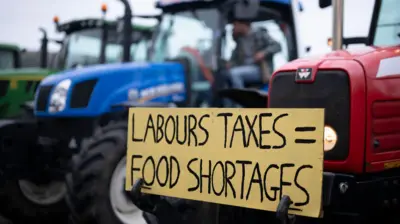We've updated our Privacy and Cookies Policy
We've made some important changes to our Privacy and Cookies Policy and we want you to know what this means for you and your data.
US retailers limit buying emergency contraceptives
Image source, Getty Images
- Author, Holly Honderich
- Role, ґуПуґ«ГЅ News, Washington
Some of the largest US retailers are rationing emergency contraception because of surging demand in the wake of the Supreme Court's abortion ruling.
Purchases of Plan B, known as the "morning-after pill", have been limited at Walmart, Amazon and Rite Aid.
Earlier this week, major pharmacy chain CVS removed its temporary cap on purchases.
Birth control is legal in the US, but some pro-choice advocates have warned of future restrictions to access.
Demand for both emergency contraceptives and abortion pills - which require a prescription - have soared in recent days, following the US Supreme Court's repeal of Roe V Wade, overturning the constitutional right to abortion.
Morning-after pills like Plan B can lower odds of pregnancy by 75-89% if taken within three days of sexual activity. The pills can temporarily block ovulation or stop a fertilized egg from attaching to the uterus - preventing pregnancy.
The drugs, which cost around $10-$50 (ВЈ8-ВЈ41), may not work for people who weigh more than 165lbs (75kg). The average American woman weighs 170.8lb, according to the US Centers for Disease Control and Prevention (CDC).
Walgreens has temporarily stopped delivering the contraceptives to customers' homes, while both Amazon and Rite Aid have limited purchases to three pills per customer.
CVS, the nation's largest pharmacy chain, told the ґуПуґ«ГЅ that its stores implemented a "temporary purchase limit" after a sharp increase in sales immediately following the Supreme Court decision. Sales have since returned to normal and the limits have been removed.
Abortion has been banned in at least seven states following Friday's landmark Supreme Court decision. Around 16 additional states are expected to ban or severely restrict the procedure in the coming weeks.
The repeal of Roe v Wade has sparked a flurry of activity by pro-choice advocates, some of whom have advocated the stockpiling of both emergency contraceptives and abortion pills - now the most common method of terminating a pregnancy in the US.
Top Stories
More to explore
Most read
Content is not available








